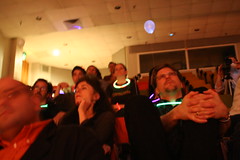Audiatur 2007 Experimental and Sound Poetry Feast

I had little rest during the five days I spent in Bergen, Norway in between DAC in Perth and the Grand Text Auto Exhibition in Irvine. Tempting as the bed seemed during my interphase jetlag, I was pulled out into the Bergen International Theater for Audiatur 2007. For four days at the end of September, it seemed that Bergen became the international capital of innovative poetry. The Audiatur Festival, in its third biennial iteration, featured a multilingual performance including many of the leading lights of the international sound and constrained poetry scenes. Christian Bök opened the festival with an energetic performance of Kurt Schwitter’s Ursonate and closed the festival with a reading that included highlights of his works Crystallography, Eunoia, and The Cyborg Opera. The talented multicultural Caroline Bergvall was on hand to present cross-cultural prose and poems. I had the pleasure of sitting at a table with Jaques Robuad of the Oulipo who read several of his highly amusing prose works, poems, and a presentation on the work of the Oulipo. Finnish poet Leevi Lehto gave a great performance of a few Finnish classics along with his sound and procedural poetry. The performances of Japanese sound poet and musician Tomomi Adachi were another highlight of the festival. The majority of the performances were recorded, and are available for your listening pleasure. The festival organizers also produced a very impressive 800-page Katalog, which may be the most extensive anthology of contemporary experimental poetry I’ve seen in any language, and certainly in Norwegian.


 Yesterday I attended a talk on authorship including a presentation by net artist and theorist Alok Nandi, who was one of the developers of the web version of the French-language graphic novel
Yesterday I attended a talk on authorship including a presentation by net artist and theorist Alok Nandi, who was one of the developers of the web version of the French-language graphic novel